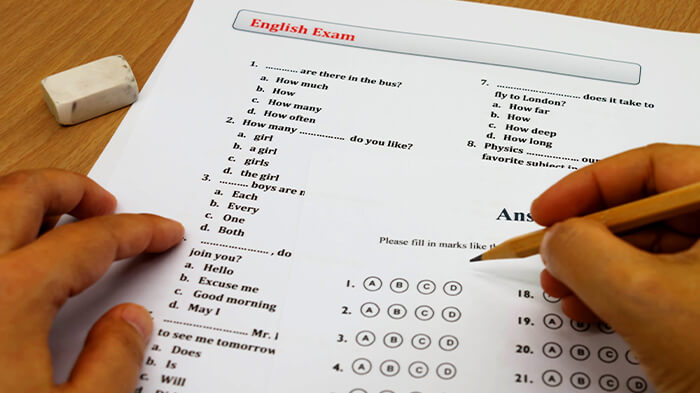What Is the 11 Plus Exam and How Can You Prepare Your Kid?
When it comes to school entrance exams for kids, parents take as much responsibility as they can to prepare their kids. In this blog, we aim to help you out with the 11 plus exam by explaining the dynamics of the 11 plus exam and giving suggestions for you to prepare your child.

We are sure that by spending the right time and effort, you and your kids will rock this exam. Let’s get straight to the point and start from the basics for eleven plus exams.
What Is the 11 Plus Exam?
The eleven plus exam, also known as the 11+ exam, transfer and grammar school test, is a non-compulsory entrance exam for selective schools.
These selective school entrance exams can be taken by children in England or Northern Ireland towards the end of year 5 or the beginning of year 6 of primary schools. It aims to identify kids with academic ability and potential.
What Is the Content of the 11 Plus Exam?
Even though the content of the 11 plus exam is highly regionalized, it generally focuses on the combination of four subjects:
- 11 plus English papers (comprehension, punctuation, grammar, and creative writing)
- 11 plus maths papers
- 11 plus verbal and non-verbal reasoning papers
While maths and English subjects are included in the National Curriculum, the verbal and non-verbal subjects are not included. Thus, if you want to prepare your kid for the eleven plus exam, you will probably need to take additional support for improving your kid's spatial awareness.
Take 11 Plus Verbal-Linguistic Intelligence Test Now!
Would you like to learn about your kid’s verbal intelligence and enhance it with entertaining practices to prepare your kid for eleven plus exams? Then, take our different alternatives of 11 plus mock test online free and check out MentalUP’s fun exercises.
What Is the Format of the 11 Plus Exam?
The 11 plus papers can be identified in two main formats: Standard and Multiple-choice. While in the standard exam papers, kids write their answers on the test paper, in the multiple-choice test papers, kids mark their answers in a separate booklet.
Usually, the 11 plus exam papers take 45-60 minutes to complete. As timing is one of the most influential factors for exam results, kids need to practice with a timed and untimed test paper at the same time, as taking an eleven plus mock test can indicate the power of your kid's memory.
💡 You can help your kid to empower their visual and verbal memory with entertaining memory games to make them more successful in the timed tests.
What is the Difference Between CEM 11 Plus and GL Assessment 11 Plus?
The CEM 11 plus and GL Assessment 11 plus tests are the main exam boards for the kids in the UK.
While GL Assessment, previously known as NFER, was developed to administer the majority of the 11 plus exams in the UK, CEM plus exam was developed later by the Centre for Evaluation and Monitoring to make eleven plus exams more unpredictable.
Both exams broadly cover English, maths, and verbal and non-verbal reasoning. But still, they have some key differences in terms of format, timing, and skills.
| Exam Boards | GL Assessment 11 plus | CEM 11 plus |
| Format | The exam is split by subjects. | The exam is not split by subjects. Rather, it splits into sections. |
| Timing | Approximately 45 minutes. | Exam timing varies from year to year. |
| Skills | Strong vocabulary, logic, spelling, and math skills. | Wide range of vocabulary, comprehension, spelling, and math skills. |
Which 11 Plus Exam Is Held in Your Region
As stated before, the 11 plus exam is highly regionalized. Below, we’ve listed which exam you will be sitting in according to your region. You can check the main administrator in your region from the list and start preparing for the 11 plus exam.
- GL Assessment: Birmingham, Buckinghamshire, Dorset, Kent, Lancashire & Cumbria, Lincolnshire, Medway, Northern Ireland, Warwickshire
- CEM: Berkshire, Bexley, Gloucestershire, Shropshire, Walsall, Wolverhampton
- GL and CEM: Devon, Essex, Hertfordshire, Trafford, Wiltshire, Wirral, Yorkshire
How Can Parents Decide Whether Their Child Should Take the Exam?
Going through long and serious tests is stressful for everyone, let alone children, at such a young age. As a result, parents should seriously consider if they want their child to take the eleven-plus exam.

You should keep in mind that although this exam sorts children into more academically-oriented schools, it is not a definitive statement of their future. Since a parent’s view of their child may be biased, it’s a good idea to consult education experts and especially their child’s teachers.
A basic and effective way to determine if your child should take the transfer test is to ask these questions:
- Does your child’s teacher think you should encourage him/her to go through the eleven-plus exam?
- Is your child scoring significantly higher than average in school exams?
- Is your child gifted academically?
- Are your child’s results above average in their SATs/CATs/PIEs/PIMs/etc.?
What Is the Attendance Rate For the Eleven-Plus Exam?
Parents should keep in mind that attendance and success rates at eleven-plus exams are higher in areas where public education is aligned with the exam. While this is an advantage for the child’s exam preparation, higher attendance comes with tougher competition.
Certain grammar schools in the Kingston and Sutton area are a good example of the correlation between competition and success rate. Although they attract thousands of applicants for around 200 vacancies, the success rate is approximately 3%.
In places such as Buckinghamshire, where the grammar system has been retained in full, success rates are roughly around 30%.
How Can You Prepare Your Kid for the 11 Plus Exam?
Sitting for the exam might be a daunting process for your kid. Thus, the first thing to start preparing for the 11 plus with your kid is to create a stress-free studying environment and ensure that your kid is having fun while studying
In the following part of this blog, you will find every detail to prepare your kid for the 11 plus exam. Keep reading!

Make Learning Fun
Supporting your kid with educational and fun exercises is a significant part of preparing your kid for the eleven-plus exam. For this process, all you need to do is provide the right exercises that will help your kid to improve their English, maths, verbal and non-verbal skills, and overall learning ability.
You can check MentalUP’s fun and educational brain games to improve your kid's learning ability, memory, attention, creativity, problem-solving, and verbal and non-verbal skills.
The MentalUP app helps you test your kid's overall learning ability and skills with more than 150 entertaining brain games. In this way, you can figure out the improvable skills of your kid and start preparing for the eleven plus exam anytime, anywhere.

You can discover MentalUP’s UK curriculum on our convenient, proven platform to boost your kid for the eleven-plus exam. 📝
Create an Early Plan For Your Kid
Eleven plus exam preparation is a long process. Thus, your kid might need a regular study schedule in advance. By providing a well-placed study plan for your child beforehand, you can have enough time to identify their main strengths and weaknesses and practice accordingly.

Keep in touch with your child’s teachers, who will help you understand how your child is performing in relation to their peers. You can start giving your child preparation tests from time to time, which will help boost your child’s confidence when they’re completing the real Eleven Plus exam.
In addition, you can give them some mental games and brain teasers to improve their overall cognitive abilities. This way, you can help them to get rid of their stress. Don’t overload your child with too much study while preparing your plan.
Get Them Familiar With the Elements of the 11 Plus Exam
As the eleven plus exam complies partly with the national curriculum in the UK, your kid might be used to maths and English question types of the exam. On the contrary, verbal and non-verbal questions might be new to them.

You can identify the main question types that your kid is not used to and work accordingly with example questions to improve their overall performance on the 11 plus exam.
Practice With Your Kid For the 11 Plus Exam
Showing your support to your kid has a great impact on your kid’s overall success for the eleven plus exams. Thus, you should try to include yourself in the process while your kid is practicing.
Some children may easily comprehend abstract scientific concepts, while some children are more suited to the social sciences. To prepare effectively for the Eleven Plus exams, it’s best to be aware of your child’s strengths and focus more of their energy on their weaknesses.
To show your support and practice with your kid, you can benefit from 11 plus practice papers, 11 plus test papers, 11 plus past papers, and fun and educational exercises.
Encourage Regular Reading
Having wide-range vocabulary skills is significant for both GL Assessment and CEM eleven plus exams.

According to the WCPO, kids who read for 20 minutes at home likely score 90% higher than their peers. Also, regular reading increases the ability of your kid to cope with verbal reasoning question types.
To encourage your kid to read a wide range of topics regularly, you can learn what kind of books they like to read and check recommended books for the entrance examinations. Also, you should set positive examples for your children and provide technology-free areas in the house.
You can’t expect your child to get lost in a book while you’re watching TV or scrolling on Facebook for hours. Children naturally mimic their parent's behavior, so your child will be more willing to read if they see you doing it.
Every child still needs to play. Preparing for the Eleven Plus exam shouldn’t mean that your child needs to study like a professional academic or digest data like a computer. Playtime is incredibly important for the intellectual development of children. 🎮
Multi-awarded app MentalUP is an effective tool for your kids with its gamified tests, learning exercises, and brain-boosting games that improve kids’ mental capacity. You can also track their status with detailed reports and compare them with their peers. 🎉
To Sum Up
We know that the process of 11 plus entrance examinations is a long and stressful road to follow for both parents and kids. But we also know that you have the power to complete this process in the most effective way.
Keep in mind that every child has their own unique skills and strengths. Forcing your child to study will neither be productive nor beneficial in the long run. While tests and exams are tools for learning and growth, they should not be viewed as the ultimate indicator of your child’s full intellectual capacity or potential for future success.
We are sure that you and your partner in crime will succeed in the eleven plus exams. Good luck! 🚀










